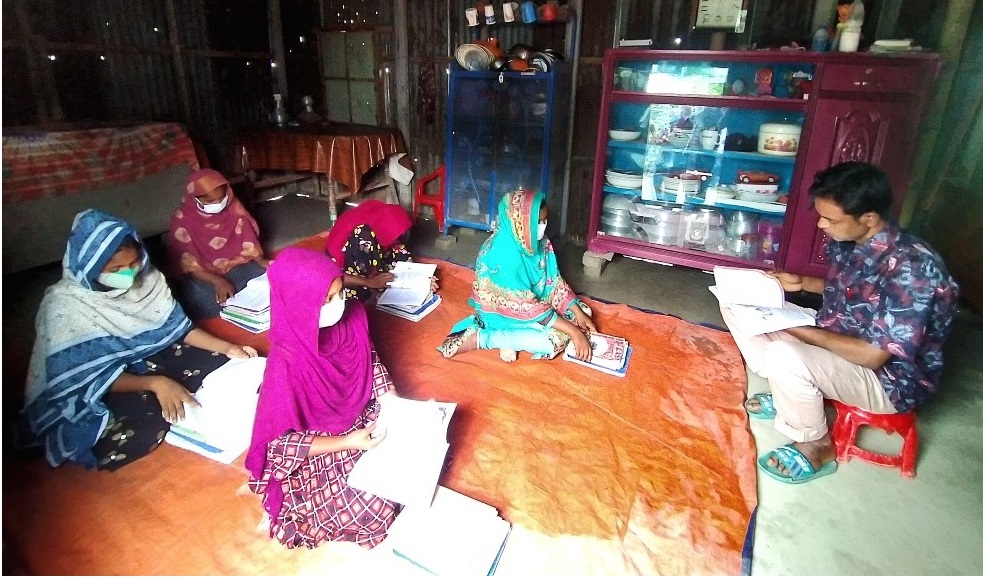
Curbing child marriage in pandemic

char sidhai gaibandha friendship group study pandemic
A small group of students attend a study session at a facilitator’s home in Char Sidhai, a river island in the Brahmaputra, just off the coast of Phulchhari upazila in eastern Gaibandha Dhaka Tribune
On top of the learning loss due to school closures owing to the Covid-19 pandemics, young girls in rural areas now revisit a nightmare that is early marriage
Twelve-year-old Yasmin Akhter (not her actual name) was an ordinary schoolgirl, living with her parents in Char Sidhai, a river island in the Brahmaputra, just off the coast of Phulchhari upazila in eastern Gaibandha.
There, among the other children of the island, she went to an NGO-run school, where she studied in the seventh grade.
For the most part, she was happy spending long hours in school— playing, laughing and learning with her classmates.
However, little did she know that her life was about to take an unexpected turn and without warning.
When the pandemic struck last year in March and all schools were shut down, Yasmin’s mother and father, like all typical rural parents, decided that it was best to marry their daughter off. It was a decision they thought appropriate considering the newly arisen uncertainty about their daughter’s future.
After her marriage, Yasmin moved to a distant char far away from home. There, she settled down with her husband and in-laws.
Fast forward to this year. Yasmin is now a full-time homemaker and mother of a baby boy. She spends most of her day busy with household chores and looking after her infant son.
Back in Char Sidhai, her best friend Sophia Akhter was overcome with sadness while narrating Yasmin’s story to journalists who were there on a visit last month.
She said: “Being away from family and friends, Yasmin has fallen into depression. Besides, she has yet to recover fully after her health largely worsened from having the baby, who has also been suffering from malnourishment since birth.”
Yasmin, once a spirited child full of possibilities and now faced with the stark realities of life, tells her friends not to make the same mistake as she did—not fighting her parents on the marriage issue.
The rate of child marriage in Bangladesh, especially among char communities, is on an alarming rise as girls are mostly staying home owing to the closure of educational institutions during the Covid-19 pandemic.
Growing concerns regarding joblessness, poverty, food scarcity and fear and insecurity among parents due to the pandemic are blamed for a surge in child marriages.
Bangladesh is currently among the top 10 countries in the world for child marriage, according to a UN report that said Bangladesh has a 51% child marriage rate.
Experts at “Friendship”, an international Social Purpose Organization working to make quality education accessible even in remote and hard to reach areas, are working to alleviate this crisis which they say might deepen if there is a further delay in the reopening of schools.
Friendship’s activities in Char Sidhai
Rashida Begum, a facilitator to eighth graders under the “Friendship Education Program” in Char Sidhai, said: “Dropping out of school has terrible consequences for children in rural areas. The girls invariably become victims of child marriage and the boys of child labour. In both cases, the children tend to lose interest in their studies.”
“So, to prevent high school students from dropping out by continuing limited-scale learning activities while schools were closed, we undertook a three-pronged approach.”
These approaches include 1. Group Study Sessions—where a small group of 4-6 students attend study sessions at a facilitator’s home, 2. Home Visits—where a facilitator makes home visits to convey lessons to students who are not able to attend group study sessions and 3. Phone Communications—where a facilitator calls students who have moved away from the area to follow up on their studies, she added.
“Besides, we also conduct student counselling and parent-teacher meetings at regular intervals to identify potential dropout cases before they take place and take action accordingly,” she added.
Mahabub Alam, assistant project manager (education), said Friendship Education Program was all about sustainability. “Friendship helps meritorious high school students pursue higher studies by helping them get admitted to colleges on the mainland.”
“Besides, students who don’t wish to stay in school after completing their matric and intermediate degrees, receive vocational training on various income-generating activities, such as homestead gardening, livestock rearing or weaving under the same program.”
Editor & Publisher: S. M. Mesbah Uddin
Published by the Editor from House-45,
Road-3, Section-12, Pallabi, Mirpur
Dhaka-1216, Bangladesh
Call: +01713180024 & 0167 538 3357
News & Commercial Office :
Phone: 096 9612 7234 & 096 1175 5298
e-mail: financialpostbd@gmail.com
HAC & Marketing (Advertisement)
Call: 01616 521 297
e-mail: tdfpad@gmail.com